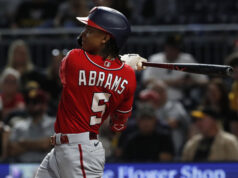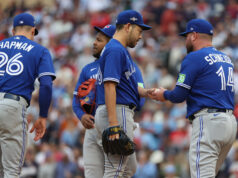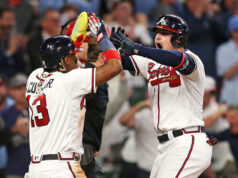Carlos Beltran has had a long, distinguished, and successful MLB career, but is he deserving of enshrinement in Cooperstown?
By Gregg Cambareri
 Baseball aficionados have had the pleasure of watching Carlos Beltran roam green outfield pastures since 1998. No, he’s never won a championship in his 18 seasons, but the Baseball Hall of Fame is measured much more by statistics, metrics, and integrity, rather than rings.
Baseball aficionados have had the pleasure of watching Carlos Beltran roam green outfield pastures since 1998. No, he’s never won a championship in his 18 seasons, but the Baseball Hall of Fame is measured much more by statistics, metrics, and integrity, rather than rings.
The eight-time all star has quietly put together a resume that will surely make a strong case for baseball immortality. However it’s worth asking–does Beltran belong with baseball’s legends, or just the Hall-of-Very-Good?
Voting for the Baseball Hall of Fame is based upon …”the player’s record, playing ability, integrity, sportsmanship, character, and contributions to the team(s) on which the player played,” per the BBWA election rules. Statistics obviously play a large part in determining a player’s candidacy, but their personal character, role in the community and as a baseball ambassador, connection to performance enhancing drugs, and relationship with the media can also help or hurt their case.
The short answer for Beltran’s HOF case: well, there is no short answer because he’s right on the fence. However, advanced metrics show that he is likely to get the call to Cooperstown.
Using the JAWS score system (for those not familiar with JAWS, it’s an advanced metrics system used to compare a players case to already enshrined Hall of Famers at a given position to help account for players who played in different decades) Beltran scores a 56.4, 8th all time among center fielders. Of the 7 center fielders above Beltran, all are in the HOF. Here’s the kicker: there are 13 CF’s in the HOF with a JAWS lower than Beltran’s. It gets better, too.
Statistician Bill James created a Hall of Fame monitor. His system calculates how likely it is that an active player enters the Hall. A score of 100 means there’s a good possibility, and anything over 130 is a near guarantee, per Pro Baseball Reference. Beltran’s current HOF monitor stands at 104, which should help his case. There’s much more to this saber metric story, though.
There are 19 center fielders in the HOF. The average career WAR of the 19 comes to 71.1, while Beltran stands just shy of the average at 68.4 (if Beltran plays at just a league average clip this season, he’ll be right around the 70 mark). There’s more evidence supporting Beltran’s case, too.
Players in the Hall are often judged by their 7 best WAR seasons. This proves if a player was able to dominate for an extended period of time. The average 7 year WAR of the 19 CF’s: 44.5 while Beltran’s stands at 44.3, which should earn him major points among the sabermetrically driven voters.
Then comes the post season.
Most people think about two years of Beltran playing in October: 2004 and 2006. His ’04 tear was one of the best in postseason history (.417 BA, 8 HR’s, 21 runs scored) but seemingly nullified by one monumental strikeout in ’06 to end the NLCS.
While the sting of one at bat will stay locked in the mind of fans, media, and baseball people forever, let’s get something straight: Carlos Beltran is an outstanding postseason performer. His .332 BA, .441 OBP, and .674 SLG suggest he owned October (his 16 homers are also top 10 all time). Let’s not allow one at bat to tarnish his otherwise excellent postseason career.
Beltran’s share of accolades are rather impressive: eight All-Star games, seven 20/20 (homers/stolen bases) seasons, three Gold Gloves, two silver sluggers, and the 1999 Rookie of the Year. He knocked in over 100 runs eight-times, scored over 100 runs seven-times, and holds the fifth best stolen base percentage among active or retired players (86.3%). His career fielding percentage stands at a sparkling .986, most of it coming playing center field, regarded as a premium defensive position. Among switch hitters, he’s fifth all-time in homers, likely to eclipse the 400 mark this season.
As we mentioned earlier, the HOF goes far behind fancy statistics. Beltran was never in legal trouble away from the diamond, never seriously connected with any performance enhancing drugs, and won the 2013 Roberto Clemente award, which is given to players who exemplify sportsmanship and positive involvement within local communities.
Beltran will have his obstacles when comes time for election. They’ll be other players on the ballot for longer than himself, who will steal some votes. There will be writers who covered other teams that Beltran played well against who won’t want to vote for him. Baseball PED legislation didn’t formally arrive until 2002, while Beltran entered the league in 1998; the steroid conspiracy theorists will have their doubts whether it’s deserved or not.
It’s not likely that he gets the call to Cooperstown during his first time on the ballot, but there are enough signs pointing to a day when Beltran is awarded baseball immortality.
You can make a compelling case that he enters Cooperstown as either a Kansas City Royal or a New York Met, but that debate is one for another day.













